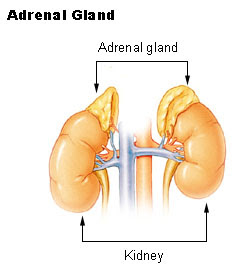 Adrenal Glands
Adrenal Glands
The adrenal glands play an integral part in ones health, a fact that is often forgotten. Many of us have under performing adrenal systems which manifests itself in a recurrent low immune system, constant state of physical and emotional stress, poor physical conditioning and a complete inability to produce sufficient energy to get you through the day.
For those of you whom biology class is but a distant memory the adrenal glands are located adjacent to the the kidneys, liver, spleen and pancreas where due to their proximity to these organs and the arterial system they can have a rapid effect throughout the whole body.
The gland is made up of two distinct areas, the cortex and the medulla. The cortex produces steroid hormones known as corticosteroids. These corticosteroids include:
- Glucocorticoids – The most important hormone produced is cortisol which helps regulate glucose metabolism, control fat metabolism, protein and carbohydrate. Cortisol helps increase blood sugar levels and provide energy for use by the body very rapidly.
- Mineral Corticoids – The most important hormone produced is aldosterone which controls the salt and water balance in the body and plays a role in blood pressure.
- DHEA(dehydroepiandrosterone) – DHEA is the starting point for estrogen and testosterone and works in opposite to cortisol. DHEA plays a role in energy, sleep, PMS and sex drive. When cortisol levels remain elevated due to stress DHEA levels are depressed. The medulla reacts by secreting two major hormones;
- Adrenaline – It is involved in the fight, fright and flight response and increases blood pressure, blood glucose levels and heart rate.
- Noradrenaline – It opposes the effects of adrenaline and acts to constrict blood vessels.
Fight, Fright and Flight Response.
The fight,fright and flight response causes many physiological reactions within the body. The triggers to this response may include anger, anxiety and frustration. The release of cortisol and adrenaline has a stimulating effect on the body and allowing it to function and ensure survival. Your body will continue to release adrenaline until the stress trigger subsides. As a result your bodies cortisol level remains high for some time after. The consequences are damaging to your physiological make up.
Following our bodies response to anger or frustration the body naturally refuels and re-stocks those stores that were used in survival mode. We therefore have an increased appetite and typically increase our food take to replenish stock. If we are unable to physically release energy we will store that unused energy in the body and we may suffer from complaints like headaches, sore neck, shoulders etc.
When stressed our blood sugar levels will drop, and the body will try to keep up by increasing blood glucose levels. When stressed we turn to foods high in sugar and drinks such as coffee and this causes an even greater release of blood glucose and insulin. Asking you body to cope with this ups and downs in blood sugar may result in a resistance to insulin which has many associated health problems.
What are the signs and symptoms of stress?
- Increased appetite
- Cravings for food (i.e., chocolate, sweets, breads, caffeine, alcohol)
- Mid afternoon slump
- Low immune system
- Headaches
- Digestive problems
- Muscle aches and pains
- Irregular or absent periods
- Depression
- Social withdrawal
- Slow metabolism
- Low sex drive
- Tiredness, fatigue, lethargy
Nutritional Approach to the Adrenal System
By making simple dietary changes you may be better able to deal with everyday stressors;
- Avoid dieting as a restriction in calorie intake can cause your body to go into survival mode which will reduce your metabolic rate.
- Eating regular and small meals will ensure stable blood sugar levels throughout the day which ultimately tells you body that it is not under stress. Typically you should eat every 5 to 6 meals per day at 3 hour intervals. Eating in a peaceful environment will minimise the release of stress hormones but eating on the run will put your body in a state of stress.
- Eating breakfast will release your cortisol levels which spike when you wake up. This spike is a natural reaction and helps you get out of bed. Consume just a coffee for breakfast will only increase cortisol levels further and results in a blood glucose spike, an insulin spike, an increase in appetite and the storage of fat.
- We should reduce our refined carbohydrate intake (white bread, white rice, pasta) and include a portion of protein with each meal (vegetable or animal). Protein will help control insulin levels. The reduction of saturated fats (found in red meat and dairy products) and the increase in essential fat intake (Omega 3’s and 6’s found in nuts, seeds and oily fish) will boost metabolism, reduce inflammation and reduce the likelihood of insulin resistance. Always try to avoid artificial sweeteners and soft drinks.
Exercise
 Exercise in the form of weight training and cardiovascular training will help by burning off energy, increase muscle mass and metabolism, prevent insulin resistance, reduce the negative effects of cortisol, improve insulin sensitivity and improve body shape.
Exercise in the form of weight training and cardiovascular training will help by burning off energy, increase muscle mass and metabolism, prevent insulin resistance, reduce the negative effects of cortisol, improve insulin sensitivity and improve body shape.
Conclusion
While some stress is important for the body, the fact is that most of us live in a constant state of stress and physiological overdrive due to the lifestyle we feel we are forced to lead. Our adrenals are been repeatedly asked to perform without reprieve and therefore we run a grave risk of fatiguing our system to a point where our health and lifestyle balance is compromised. Maintaining regular exercise and balanced eating habits may be the key to attaining that lifestyle balance we have always craved yet never achieved.


